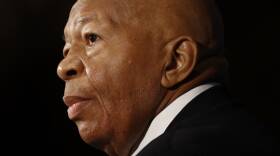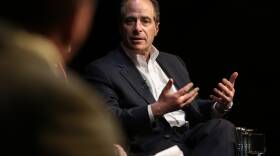EXPLORE MORE
Monday on BPR, live from Brighton:
Brown University gun violence scholar Ieva Jusionyte
Princeton University's Khalil Gibran Muhammad
Food policy analyst Corby Kummer
Comedian Jimmy Tingle
Co-founders of Boston HEAT (Human Exploitation Advocacy Team)
Recent segments
-
Chuck Todd On The Passing Of Rep. Elijah Cummings
Cummings was on his way to being the first African American speaker of the House, Chuck Todd said. -
Juliette Kayyem: Trump's Abandonment Of Kurds Denigrates Us As A Nation
President Trump has sought to distance the United States from the ongoing conflict between the Kurds and the Turkish government. -
Andrea Cabral On Dzhokhar Tsarnaev's Death Sentence Appeal
Tsarnaev's attorneys say they brought concerns an unfair trial to the court, but their allegations were never looked into. -
Do Dogs Increase Your Lifespan? Sy Montgomery Weighs In
“The Magnificent Migration” author says the study is only the latest in a string of dog-positive research. -
Jared Bowen Reviews 'The Lighthouse' Film
WGBH's executive arts editor gave his latest reviews on film and television. -
Stop Handgun Violence Organization Marks 25 Years Of Activism
John Rosenthal joined the show to advocate for federal gun regulation.
Listen to previous shows
-

Corby Kummer on the Restaurateurs Urging Congress to Replenish the Restaurant Revitalization Fund
Sen. Elizabeth Warren sat down with Mass Restaurants United and local restaurateurs in Cambridge for a roundtable discussion on Jan. 25 to hear the struggles they’ve faced throughout the pandemic. Chief among them is a call to replenish the Small Business Administration’s (SBA) Restaurant Revitalization Fund (RRF) as restaurateurs enter a third year of uncertainty during the pandemic. Award-winning food writer Corby Kummer joined Boston Public Radio to share his thoughts on the major takeaways from the roundtable, as well as replenishing the RRF. “It was a lot of restaurant people saying, ‘Hey, what is it with this administration? They promised us something,’” Kummer told Boston Public Radio. “But more than just complaining, they're advocating for [an additional] $60 billion in federal aid to the depleted Restaurant Revitalization Fund.” Some participants at the Jan. 25 roundtable shared that their restaurants would not have survived if it weren’t for money received from the RRF; others expressed frustration, either finding out that their restaurants were ineligible or that they had been approved for money and had yet to receive it. Kummer said that while the Small Business Administration had good intentions with the Restaurant Revitalization Fund, a messy rollout led to the fund operating more like a lottery. “The Biden administration wanted to prioritize restaurants owned by women, people of color, [and] veterans. They were supposed to be at the head of the line, and then a bunch of white, non-minority, non-women, males, [had] affirmative action challenges and said, ‘How dare you, I'm a struggling business man too. Give me the money,’” Kummer said. “Unfortunately, the challenges were upheld, but it put the whole thing into disarray and chaos.” “Many of the restaurants that were supposed to be at the end of the line, for some quirk, got put at the head of the line. Suddenly they were in, and the money went out, whereas a lot of restaurants that had been approved were held in limbo, and then the fund ran out of money.” During the wide-ranging interview, Kummer also discussed the Aspen Institute’s Food Is Medicine Initiative, as well as the growing number of restaurants getting rid of their landline phones for orders. Kummer is the executive director of the Food and Society policy program at the Aspen Institute, a senior editor at The Atlantic and a senior lecturer at the Tufts Friedman School of Nutrition Science and Policy. -

BPR Full Show: Bye Bye Brady
Today on Boston Public Radio: We begin the show by opening phone lines, asking listeners for their thoughts on Tom Brady’s retirement. Trenni Kusnierek weighs in on Tom Brady’s retirement, and Rafael Nadal’s record 21 Grand Slam tennis titles. She also talks about athletes’ COVID-19 precautions at the Beijing Olympics. Kusnierek is a reporter and anchor for NBC Sports Boston, and a weekly Boston Public Radio contributor. Carol Rose shares her analysis of a federal judge rejecting a hate crimes plea-deal for the murder of Ahmaud Arbery, and Justice Stephen Breyer’s retirement announcement. Rose is the Executive Director of the ACLU of Massachusetts. Alexandria Onuoha discusses the crisis of missing Black women and girls in Mass., and calls for increased community and political support to protect Black women and girls. Onuoha is the Director of Political Advocacy for Black Boston, a nonprofit focused on fighting injustice and creating community in Boston’s Black community. Corby Kummer talks about the restaurants ditching their landline phones, and the restaurateurs urging Congress to replenish the Small Business Administration’s Restaurant Revitalization Fund. Kummer is the executive director of the Food and Society policy program at the Aspen Institute, a senior editor at The Atlantic and a senior lecturer at the Tufts Friedman School of Nutrition Science and Policy. John King updates us on the latest political headlines, focusing on former President Donald Trump’s staff drafting versions of an executive order to seize voting machines. King is CNN's Chief National Correspondent and anchor of "Inside Politics,” which airs weekdays and Sunday mornings at 8 a.m. We wrap up today’s show by continuing our conversation with listeners on Tom Brady. -

BPR Full Show: After the Snow
Today on Boston Public Radio: We begin the show by opening phone lines, talking with listeners about youth mental health during the pandemic. John Della Volpe talks about Gen Z’s relationship to political activism, and the events that pushed them to action. Della Volpe is director of polling at Harvard Kennedy School’s Institute of Politics and a former Biden campaign adviser. His new book is: “Fight: How Gen Z Is Channeling Their Fear And Passion To Save America.” EJ Dionne discusses a surge in book ban efforts across the country. He also weighs in on the road ahead for President Joe Biden’s first nominee to the Supreme Court. Dionne is a senior fellow at The Brookings Institution. His latest book is “Code Red: How Progressives and Moderates Can Unite to Save Our Country.” Dan Adams updates us on the latest headlines from the local marijuana industry, including Gov. Charlie Baker’s filing of the Clardy Law, which would treat driving impairment from alcohol and marijuana the same way. Adams is a cannabis reporter and author of the “This Week in Weed” newsletter for the Boston Globe. Revs. Irene Monroe and Emmett G. Price III share their thoughts on the Pope’s statement on COVID-19 information, and the state of the Supreme Court. Rev. Monroe is a syndicated religion columnist and the Boston voice for Detour’s African American Heritage Trail. Rev. Price is founding pastor of Community of Love Christian Fellowship in Allston, the Inaugural Dean of Africana Studies at Berklee College of Music. Together they host the “All Rev’d Up” podcast at GBH. Richard Blanco shares some of his favorite winter-themed poems, including Wallace Stevens’ “The Snowman,” Jay Parini’s “Below Zero,” and Mark Strand’s “Lines for Winter.” Blanco joins us regularly to lead Village Voice, a conversation about how poetry can help us better understand our lives. He’s the fifth presidential inaugural poet in US history. His latest book, “How to Love a Country,” deals with various socio-political issues that shadow America. We end the show by asking listeners how they handled Saturday’s snow storm. -

BPR Full Show: Snowpocalypse
Today on Boston Public Radio: We begin the show by talking with listeners about the blizzard heading towards Massachusetts this weekend. Judge Nancy Gertner discussea Justice Stephen Breyer’s retirement announcement, and the current state of the Supreme Court. Judge Gertner is a retired U.S. District Judge for the U.S. District Court here in Massachusetts. She’s currently a Senior Lecturer on Law at Harvard University. Callie Crossley talka about the states fighting back against threats to voting rights, and the students at Wharton who believe that the average American worker makes over six-figures per year. Crossley hosts GBH’s Under the Radar and Basic Black. Anthony Everett shares the legacy of the WCVB television series “Chronicle,” which is celebrating its 40th anniversary. Everett is the Emmy Award-winning anchor of “Chronicle,” WCVB Channel 5's nightly news magazine. Its 40th Anniversary special airs tonight at 8 on WCVB. Sarah Harmon talks about organizing “Primal Scream” events around Greater Boston, and stress relief during the pandemic. Harmon is a mother, a therapist, a yoga and mindfulness teacher who runs multiple wellness groups, including Sarah Harmon Wellness, The School of MOM and The Postpartum Wellness Group. Sue O’Connell shares her thoughts on Michael Avenatti’s cross-examination of Stormy Daniels, and Sarah Palin's restaurant visit two days after testing positive for COVID. O’Connell is the co-publisher of Bay Windows and the South End News, as well as NECN's political commentator and explainer-in-chief. We wrap up the show by asking listeners how they’re handling pandemic stress. -

BPR Full Show: Gov. Baker, AG Healey, and more
Today on Boston Public Radio: Gov. Charlie Baker discusses current vaccination rates in Mass., and overpaid unemployment benefits in the state. He also takes listeners’ calls during “Ask the Governor.” Andrea Cabral shares her thoughts on the delay of Mayor Michelle Wu’s vaccine mandate for city workers, and a new gun law in San Jose that requires gun owners to have liability insurance and pay an annual fee. Cabral is the former Suffolk County sheriff and Massachusetts secretary of public safety. She’s currently the CEO of the cannabis company Ascend. Chuck Todd updates us on the latest political headlines, focusing on President Joe Biden’s potential picks for Justice Stephen Breyer’s replacement and rising tensions between Russia and Ukraine. Todd is the moderator of “Meet The Press” on NBC, host of “Meet The Press Daily” on MSNBC and the political director for NBC News. Attorney General Maura Healey discusses her decision to run for governor, and the dismissed charges in the Holyoke Soldiers’ Home case. We end the show by talking with listeners about Spotify’s refusal to remove Joe Rogan from their platform.








